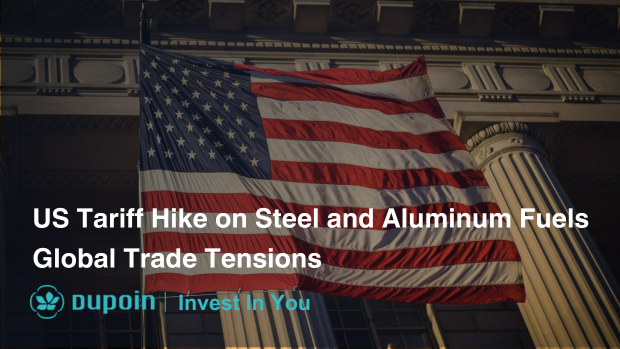

US Tariff Hike on Steel and Aluminum Fuels Global Trade Tensions

The United States, under the Trump administration, has implemented a 25% tariff on steel and aluminum imports, aiming to revitalize its domestic manufacturing industries. This measure, presented as a strategic move to strengthen American production, has sparked intense debate worldwide, with global leaders, industry experts, and economists warning of possible trade conflicts and negative economic consequences.
Protecting American Manufacturing
President Donald Trump introduced these tariffs as part of his broader economic agenda to reduce dependence on foreign imports and support domestic industries. He emphasized that the move is vital for ensuring national security and reviving the U.S. steel and aluminum sectors, which he claims have suffered due to unfair trade practices.
“The American steel and aluminum industries are essential to our economy and national security. We must protect them from unfair competition and foreign dumping,” Trump stated.
According to the administration, the tariffs are designed to create a more competitive environment for U.S. manufacturers and encourage domestic production. Proponents of the policy believe it could lead to job creation in the steel and aluminum industries, benefiting communities reliant on these sectors.
Global Reactions and Trade War Concerns
The tariffs have faced significant backlash from international trading partners, including the European Union, China, Canada, and Mexico. These countries argue that the tariffs violate World Trade Organization (WTO) regulations and could trigger retaliatory actions, potentially leading to global trade disputes.
European Commission President Ursula von der Leyen criticized the tariffs, stating, “These unilateral tariffs undermine international trade and threaten the global economy. We will respond in a measured and appropriate manner to safeguard our interests.”
China, the world’s leading steel producer, expressed strong opposition, warning that the tariffs could create a global supply glut and disrupt international trade flows. The Chinese Ministry of Commerce called on the U.S. to reconsider the tariffs and engage in dialogue to resolve trade conflicts.
In North America, Canada and Mexico, key partners under the USMCA trade agreement, voiced strong objections.Canadian Prime Minister Justin Trudeau condemned the tariffs as "unacceptable" and suggested that Canada might take retaliatory actions to safeguard its industries.
Impact on U.S. Industries and Consumers
While the tariffs aim to protect domestic manufacturers, critics argue they could have unintended consequences for other sectors of the U.S. economy. Industries relying on imported steel and aluminum, such as automotive and construction companies, fear rising costs and potential supply shortages.
The National Association of Manufacturers (NAM) warned that the tariffs might reduce competitiveness and lead to job losses in downstream sectors. NAM President Jay Timmons remarked, “Increasing tariffs on steel and aluminum imports could raise production costs for American manufacturers, making them less competitive on the global stage.”
Moreover, economists suggest that consumers could feel the impact through higher prices on products ranging from automobiles to household appliances.
Economic Implications and Expert Opinions
Experts remain divided on the potential economic effects of the tariffs. Some believe they could provide a temporary boost to domestic steel and aluminum production. In contrast, others warn of long-term consequences, such as inflation and slower economic growth.
According to the Peterson Institute for International Economics, the tariffs could reduce exports from affected countries, prompting them to impose retaliatory tariffs on U.S. goods. This scenario could escalate into a global trade war, potentially destabilizing the world economy.
Trade policy analyst Chad Bown noted, “History shows that protectionist tariffs often lead to retaliation and economic disruption. The risk of a global trade war is real, and the consequences could be severe.”
Political Reactions and Domestic Debate
The tariffs have ignited political debate within the United States. Lawmakers from steel-producing states have generally supported the move, while others, including some from Trump’s own party, have voiced concerns about the potential economic fallout.
Senator Ben Sasse of Nebraska criticized the tariffs, arguing, “Trade wars are harmful and damaging to all involved. These tariffs are effectively a tax on American consumers and businesses.”
Conversely, Senator Sherrod Brown of Ohio endorsed the measure, stating it would protect American jobs and revitalize the domestic steel industry. “Our steelworkers have dealt with unequal competition for far too long.,” Brown asserted.
The Road Ahead
As the tariffs take effect, international responses remain uncertain. Some countries have indicated plans to challenge the tariffs through the WTO, while others consider retaliatory measures.
Despite global criticism, the Trump administration stands firm, arguing that the tariffs are essential for national security and economic growth. In a follow-up statement, Trump reaffirmed his commitment to protecting U.S. industries, saying, “We will not allow other countries to exploit our industries. The era of unfair trade is over.”
Conclusion
The 25% tariffs on steel and aluminum imports mark a bold yet contentious step by the Trump administration. Intended to bolster domestic industries, the move has sparked international criticism, fears of trade wars, and domestic debate over its economic impact. As trade negotiations unfold and global leaders consider their responses, the long-term effects of these tariffs on the U.S. economy and international trade relations remain to be seen.
Disclaimer
Derivative investments involve significant risks that may result in the loss of your invested capital. You are advised to carefully read and study the legality of the company, products, and trading rules before deciding to invest your money. Be responsible and accountable in your trading.
RISK WARNING IN TRADING
Transactions via margin involve leverage mechanisms, have high risks, and may not be suitable for all investors. THERE IS NO GUARANTEE OF PROFIT on your investment, so be cautious of those who promise profits in trading. It's recommended not to use funds if you're not ready to incur losses. Before deciding to trade, make sure you understand the risks involved and also consider your experience.
